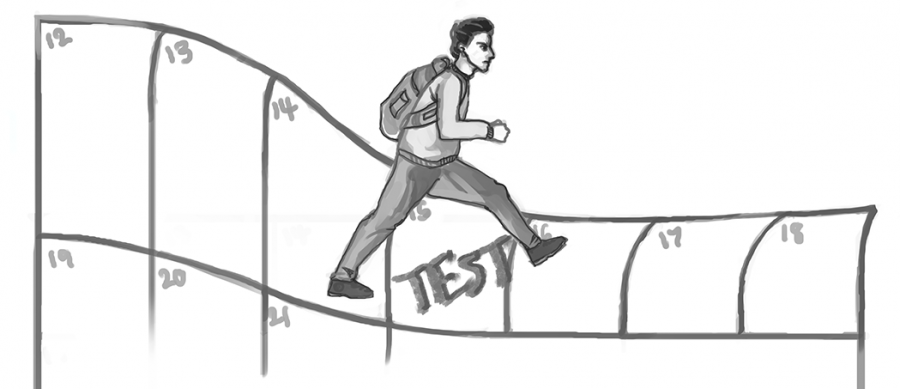When Greg* ’17 got home from Peer Support on a Monday night, the last thing he wanted to do was pull an all-nighter to finish his English essay.
He’d had to pull them before, and the grueling effects of working all night deterred him from ever doing it again. The memories of trudging through the day tired out of his mind were still fresh, so when he got home that night, he went straight to bed.
“I didn’t really want to stay up super late to do it, so I missed school,” Greg said. “Last year, I [skipped school] a couple times when I would have a test and wouldn’t do a good enough job of prioritizing [studying].”
Skipping school or class periods to avoid tests and quizzes seems to be a common occurrence at Harvard-Westlake, Greg said.
“I think it is pretty frequent,” he said. “There are certainly people who don’t [miss classes to skip tests] and who pride themselves on not doing it, but I think, overall, most people have done it at least a couple of times.”
In a Februrary Chronicle Poll, 342 out of 349 people said that they believe that people miss school to skip tests or quizzes, while 29 percent said they have skipped school to avoid a test or quiz.
For teachers, it can be hard to tell if a student is actually sick or skipping school to study.
“I guess what it really boils down to is, sure, there are probably some students who are absent on the day of the test,” math teacher Kent Nealis said. “Unless it’s egregious, where it happens time after time, there really isn’t going to be any consequence because you really have to take people at their word. If it’s an excused absence, it’s an excused absence.”
It is also possible for disciplinary measures to be taken if a student demonstrates that they consistently miss test or class days. If the student does this, and the teacher notifies the dean, the dean will typically get in contact with the student first, Upper School Dean Chris Jones said.
“Typically, it starts with the student to see what is going on and recognize that this is a pattern,” Jones said. “If it is something that doesn’t stop at that point, then it is something that we usually will discuss with the families. Unless there is something major going on, it usually stops.”
According to the Harvard-Westlake Student-Parent Handbook, unless the student has been excused in advance by a dean, in order for him or her to participate in athletics, performing arts or other extracurricular activities, that person must be in all of their classes for that day.
“Students must attend all of their classes on a game day, so that’s kind of their exam, the way we see it,” Attendance Coordinator Gabe Preciado said. “They can’t, for example, miss [some of their classes] and then go to their game.”
Jones believes that teachers will most likely be more lenient with a sophomore than a senior if it has to do with the student overextending himself or herself. Also, he said that there are situations in which teachers have been accommodating to the needs of students if the excuses are legitimate.
“There definitely are reasons that are ultra-legitimate, and I’ve never seen a teacher not be reasonable about that,” Jones said.
Although teachers do occasionally grant extensions, some students are sometimes hesitant to ask for one, Greg said.
“I think the student figures missing school is effectively the same as asking for an extension and being granted one, and so asking doesn’t inherently grant you much benefit unless you get a multi-day extension,” Greg said. “And I mean, it could provide [the student] with a moral benefit, but a lot of students don’t really care about that.”
Some believe that students need to be more willing to be upfront with teachers, while teachers should be more open to granting extensions.
“I think that you won’t know unless you ask a teacher [for an extension], and more often than not, my teachers have been very accommodating when I have had an issue,” Gillian Gurney ’17 said. “But I have heard some stories about when specific teachers have been pretty hard on students. I think we need to meet in the middle. Students need to be more up to asking teachers [for extensions], and teachers need to be more accommodating.”
Although she doesn’t believe it is right, Daria Arzy ’18 said she sees the reasons for and against taking a day off.
“It is unfair to the teacher and the students if someone consistently misses class in order to avoid a test or quiz,” Arzy said. “That being said, I know how stressful school can be, and I understand if someone needs to occasionally take a day off to recharge.”
Thirty-five percent of the 349 students polled said that they believe it is fair for students to miss school to miss a test or quiz.
It can also be unfair to the students who came to class for the test or quiz, no matter how prepared they are, when their classmates skip class to gain extra time to study, Gurney said.
“I think that I just have a different philosophy than other people, so it’s a little frustrating for me to see that people aren’t sick and get to go home and essentially have an extra day to study,” Gurney said. “It almost seems like they are given more time, and it’s unfair.”





























